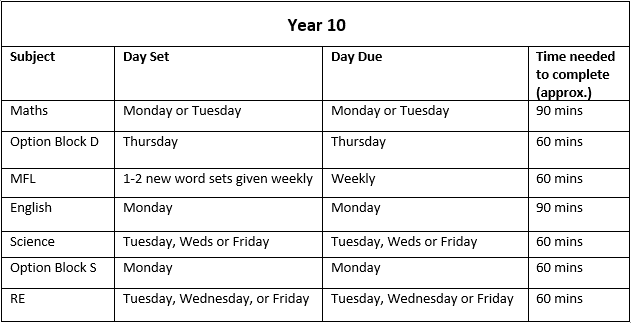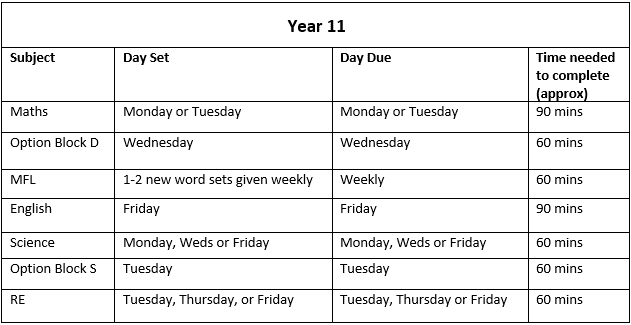This area of our website is dedicated to helping parents and carers support students to achieve their potential.
If you do not find the information that you require, please do not hesitate to get in touch with us, we will be happy to help.
How and when will my child be assessed?
Teachers have also shared exam revision strategies and topic lists with students to aid their revision at home.
- Tutors hold regular mentoring sessions for students in tutor time. These are organised so that students are grouped according to their needs and tutors can give tailored advice on next steps.
- There are a whole range of revision and intervention sessions available to year 11 students – the most up to date schedule of these sessions is always sent out to Year 11 parents.
- Subject teachers are almost always willing to give extra advice and support – but students should also bear in mind that teachers already work extremely hard to support them in lesson times and intervention sessions and that the time available for one-to one support /explanation may be limited.
- The careers team is available in the Careers Library in B block for drop-in questions at break time and after school. Students can email careers ( [email protected]) if they would like to make an appointment
- If your child is worried or upset about any issue in school either you or they should contact their Assistant Head of Year.
- Year 10 Assistant Head of Year – Miss Raj, email [email protected]
- Year 11 Assistant Head of Year – Mr Harilal, email [email protected]
- Year 10 Assistant Head of Year – Miss Raj, email [email protected]
- Students have access to the Revision dashboard of the School Library database: Rushey Mead Academy Library Please encourage them to use this to support with revision at home or in school
Sit down with your child and ask them to rank where they stand on the follow questions
RMA HOMEWORK POLICY
At Rushey Mead Academy we are always looking at ways we can further support students with their academic growth. Homework has been an area that the school has identified for improvement and following research we have been able to develop a homework timetable for each year group, as advised by the DFE. The timetable will include:
- When homework in each subject will be set
- When homework in each subject will be due
- Approximately how long it will take to complete.
Research tells us that providing students and parents/carers with this homework timetable will allow for effective study routines to be created as well as improve student mental health and wellbeing as they can see in advance their homework workload on from each day and plan their subsequent time accordingly.
Homework timetable from now will be as below.


This timetable will continue weekly (regardless of week A or week B).
With students now having a consistent weekly homework pattern, it will allow us to provide greater support for students. We will be able to provide example timetables to help them study at home and provide tips and advice to help them work more effective on their homework.
We ask that parents support their child by having conversations at home with them about the homework timetable and how they are getting on with the completion of the homework. Parents can also support their children be viewing the study skills videos we have on the Rushey Mead Academy YouTube page. Please see the link below.
Types of Homework Students will be set

We have also developed a new, research informed, system to support students who don’t complete their homework.
Every time a homework deadline is missed, students will receive a Homework consequence (1 negative point) that parents/carers will be informed of via the MCAS app. However, students will not receive a C2 or C3 should they fail to complete the homework following second and third deadlines. Instead, they will be continually issued with a Homework consequence. This is because detentions for homework are ineffective for the following reasons:
- The student needs to complete the Rushey Way, meaning they still don’t complete the homework and can find themselves in a cycle of detentions for one piece of homework.
- Students develop a negative attitude to homework as they are regularly punished for it, making them less likely to engage with homework in the future.
With the new system, if they accumulate a number of points that causes concern in one week, they will be required to attend a homework support club on the following week after school until 4pm. A member of staff and homework ambassadors will be at hand to support them and help them complete the homework. If your child is required to attend homework support club, you will be sent communication from school. If your child fails to attend the homework support club, they will lose their social time the following day.
Homework support clubs
Year 7 and 8 will run on Tuesdays 3pm – 4pm.
Year 9 will run on Wednesdays 3pm – 4pm
Year 10 will run on Thursdays 3pm – 4pm
Year 11 will run on Fridays 3pm – 4pm
At Rushey Mead Academy we recognise the importance of homework to embed the learning in lessons and help students to develop effective study skills that will support them as they approach their exams. Therefore, any student who is not completing homework is missing out on the essential benefits homework provides and needs support and guidance that homework support club can offer.
Tips for coping with exam stress

Exam stress can feel like a lot to cope with, but there are things you can do to improve your wellbeing. We have tips and ideas to help you cope at different times:
Remember: we are all unique, so what works for you might be different to what works for someone else. You might also have to try a few different things to see what works best.
During exam period
The exam period can feel long and difficult, and you might feel under pressure.
You can look after yourself in different ways:
- Make time for things you enjoy. Find ways to release stress and celebrate progress. You could listen to music, draw, cook, play with a pet or go for a walk. You can try things alone or with friends.
- Talk to others about how you feel. Connect with other people, especially people who are going through the same thing.
- Try to find balance. Take regular breaks and be realistic about what you can do in a day. Keep things in perspective and remember that exams won’t last forever.
- Take care of your physical health. Make sure you get enough sleep, food, water and exercise. If you take regular medication, keep up with your routine.
- Focus on yourself. Try not to compare yourself to others. Think of things you like about yourself and what you’re good at – this can help boost your confidence.
Preparing for an exam
While you’re preparing an exam, you could try lowering stress levels by:
- Finding a study group. If you don’t find one at school, try starting one with friends or people in your class.
- Making a revision timetable. This helps organise your revision and your breaks. You can find useful tips in your Revision Strategies Booklet.
- Working in the best way for you. Be creative or active if it helps, like drawing diagrams or making up songs. Try being open to different types of studying and revision.
- Revising in the best place for you. You might prefer the quiet or being around others. If you don’t have a space to study at home, you could try at school, the library, a cafe, or a family member or friend’s house.
Remember: feeling stressed about exams is normal, but you don’t have to struggle on your own.
If you feel overwhelmed, or like you are struggling with your mental health, support is available for you to talk things through. You deserve help as soon as you need it.
Speak to your Year Team or email [email protected].
Study Skills Video
A comprehensive range of study skills videos are available for parents and carers to support children with revision. Each video discusses a different mechanism for support so please set aside some time to discuss these with your child.

 Make A Positive Difference
Make A Positive Difference